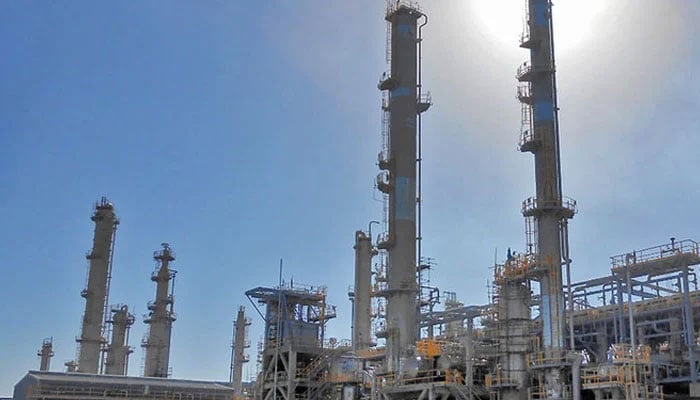Refineries to hold back $5bn investments over tax exemption dispute
Federal government to reconsider these changes, restore petroleum products to taxable status and reinstate Section 102A in the Income Tax Ordinance, 2001
ISLAMABAD: Under the new scenario, all local refineries have decided not to sign implementation agreements (IAs) with Ogra, putting over $5 billion in investment for their upgrade projects in the doldrums.
This decision stands until the government reverses the exemption of sales tax on petrol (MS), high-speed diesel (HSD) and light diesel oil (LDO) introduced in the finance bill, a senior official familiar with the matter told The News.
“This change by the government in the Finance Act on Refineries has a significant impact that may render existing refining operations unsustainable, make projects and investments under the amended brownfield policy for upgradation of local refineries economically unviable, significantly affecting project internal rates of return (IRRs),” the official said.
The government’s measure effectively nullifies the incentive package of $1.650 billion offered through the ESCROW account, leading to a loss of $1.152 billion due to the impact of sales tax exemption. The refineries argue that this alteration has made their upgrade projects economically unsound and unsustainable, as the shift from zero-rated status to exempt status for sales tax on MS, HSD and LDO will only increase operating and project costs.
In discussions with senior officials at OGRA, the refineries plainly stated their refusal to sign IAs under the current exemption of sales tax on these products, which could result in disallowance of up to 80-85 percent of input tax, leading to substantial cost increases.
Earlier, the Pak-Arab Refinery Company (PARCO), Attock Refinery Limited (ARL), Pakistan Refinery Limited (PRL), National Refinery Limited (NRL), and Cnergyico Pk Limited (CPL) jointly wrote to the secretary of the Petroleum Division, highlighting these concerns and urging the government to restore petroleum products’ taxable status instead of exempt status, and to reconsider reinstating Section 102A in the Second Schedule of the Income Tax Ordinance, 2001.
In their letter, they emphasized the critical and strategic role of the refining industry in Pakistan’s economic growth and energy security, fulfilling 50% of the country’s petroleum needs and saving foreign exchange by reducing imports.
They acknowledged the government’s efforts to attract over $5 billion in refining industry investments through the Refining Policy for Upgradation of Existing/Brownfield Refineries 2023, which was amended in February 2024 and recently extended until October 2024. However, they expressed concerns that provisions in the recently approved Finance Bill could undermine the policy’s intended benefits.
The refineries also pointed out that governments typically provide subsidies or grants to local industries to finance projects, which are usually exempt from tax. Previously, Clause 102A of the Income Tax Ordinance, 2001, provided similar exemptions in Pakistan. With the revised law, these exemptions have been withdrawn, impacting refinery upgrade projects where incentives will no longer be treated as tax-exempt government grants.
The refineries urged the federal government to reconsider these changes, restore petroleum products to taxable status and reinstate Section 102A in the Income Tax Ordinance, 2001.
-
 King Charles Secretly Relies On Advice From THIS Royal
King Charles Secretly Relies On Advice From THIS Royal -
 Jennifer Garner Reveals Beauty Choice She Makes As Botox Alternative In Her 50s
Jennifer Garner Reveals Beauty Choice She Makes As Botox Alternative In Her 50s -
 Kate Middleton Drops Four-word Message For Young Girl After Wales Visit
Kate Middleton Drops Four-word Message For Young Girl After Wales Visit -
 Shamed Andrew Uncensored ‘massages’ Should Be Refunded To Public
Shamed Andrew Uncensored ‘massages’ Should Be Refunded To Public -
 Kylie Kelce Reveals Rules She Wants Daughter Bennett To Learn At 3: No More 'passies'
Kylie Kelce Reveals Rules She Wants Daughter Bennett To Learn At 3: No More 'passies' -
 Smartphone Market Set For Biggest-ever Decline In 2026
Smartphone Market Set For Biggest-ever Decline In 2026 -
 Mud, Rain, Loincloths: All About Japan’s 200-year-old Harvest Wrestling Ritual
Mud, Rain, Loincloths: All About Japan’s 200-year-old Harvest Wrestling Ritual -
 Jonathan Majors Set To Make Explosive Comeback To Acting After 2023 Conviction
Jonathan Majors Set To Make Explosive Comeback To Acting After 2023 Conviction -
 Next James Bond: Why Jacob Elordi May Never Get 007 Role?
Next James Bond: Why Jacob Elordi May Never Get 007 Role? -
 Maddox Drops Pitt From Surname In Credits Of Angelina Jolie’s New Film 'Couture' Despite Truce From Father's End In Legal Battle
Maddox Drops Pitt From Surname In Credits Of Angelina Jolie’s New Film 'Couture' Despite Truce From Father's End In Legal Battle -
 Meghan Markle Adds Diamonds To Engagement Ring For Jordan Trip
Meghan Markle Adds Diamonds To Engagement Ring For Jordan Trip -
 Burger King Launches AI Chatbot To Track Employee Politeness
Burger King Launches AI Chatbot To Track Employee Politeness -
 Andrew’s Woes Amid King Charles’ Cancer Battle Triggers Harry Into Action For ‘stiff Upper Lip’ Type Dad
Andrew’s Woes Amid King Charles’ Cancer Battle Triggers Harry Into Action For ‘stiff Upper Lip’ Type Dad -
 Experts Warn Andrew’s Legal Troubles In UK Could Be Far From Over
Experts Warn Andrew’s Legal Troubles In UK Could Be Far From Over -
 Teyana Taylor Reflects On Dreams Turning Into Reality Amid Major Score
Teyana Taylor Reflects On Dreams Turning Into Reality Amid Major Score -
 Jennifer Garner Drops Parenting Truth Bomb On Teens With Kylie Kelce: 'They're Amazing'
Jennifer Garner Drops Parenting Truth Bomb On Teens With Kylie Kelce: 'They're Amazing'




